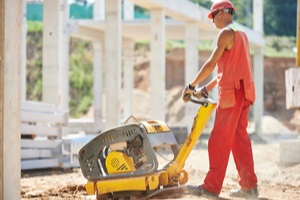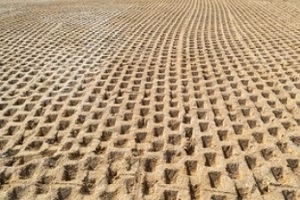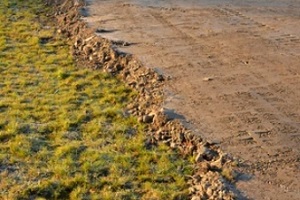 Soil is one of the most abundant natural resources on our planet, and it serves as the foundation of many construction projects. Although it is a great base for projects ranging from buildings to streets, it needs to be compacted before work gets underway so it will be able to support whatever is built on top of it.
Soil is one of the most abundant natural resources on our planet, and it serves as the foundation of many construction projects. Although it is a great base for projects ranging from buildings to streets, it needs to be compacted before work gets underway so it will be able to support whatever is built on top of it.
This process has been used for many years to improve construction projects. Recent advances in technology and equipment design mean that modern soil compaction equipment is highly efficient and can achieve a significant degree of compaction. Here is a look at what soil compaction entails and the many benefits of using this process in construction.
What Is Soil Compaction?
Soil’s characteristics change depending on several factors, including its levels of moisture and air. When soil has been recently disturbed, it takes on a fluffier texture and is softer, while soil that has been pressed down firmly is stronger and more solid. Soil compaction aims to densify loose soil by reducing the space between the pores in the soil and removing the voids that are typically found between soil particles.
It is a fundamental component of soil engineering and construction as it gives soil the flat base necessary for supporting buildings, roads and other structures. It also provides soil with greater resistance and stability. However, it must be carried out properly or the completed structure could be at risk.
To compact soil, pressure is combined with weight to collapse the air pockets within the soil. Many types of specialized equipment are available for soil compaction depending on the soil’s properties and the amount of soil that needs to be compacted. For example, cohesive soils are typically compacted using padfoot compactors, while non-cohesive soils tend to compact better with vibratory smooth drum rollers.
Soil compaction is quantified using a percentage. A common threshold for ensuring a construction project will have a solid base is 95 percent compaction. This means that the soil has been compacted to 95 percent of its possible density. Testing can be used to determine a specific soil’s optimum moisture content and maximum dry density. Building design engineers can provide a threshold based on the bearing capacity needed to ensure the finished project’s structural stability.
The Benefits Of Soil Compaction In Construction
Here is a closer look at some of the biggest benefits of compacting soil prior to any type of construction:
It Supports Buildings
 One of the most obvious benefits of soil compaction in construction is that it gives soil the ability to support buildings. If a building is constructed on soil that has not been compacted properly, it could eventually collapse. Compacting soil makes it dense enough to handle the weight of the construction project. Skipping this step could cause the soil to move unexpectedly later or allow water to absorb and penetrate beneath the building, putting the entire structure at risk.
One of the most obvious benefits of soil compaction in construction is that it gives soil the ability to support buildings. If a building is constructed on soil that has not been compacted properly, it could eventually collapse. Compacting soil makes it dense enough to handle the weight of the construction project. Skipping this step could cause the soil to move unexpectedly later or allow water to absorb and penetrate beneath the building, putting the entire structure at risk.
It Raises the Bearing Capacity of the Soil
A soil’s bearing capacity refers to the maximum amount of contact pressure it can withstand before it shears. Having a higher bearing capacity is useful for all types of structures, particularly footings and foundations.
It Prevents Erosion
Soil is vulnerable to erosion thanks to its constant exposure to the elements. Compacting it prevents sliding, which can allow water to pass underneath the surface of a foundation, where it can cause erosion damage and uplift pressure that could put the entire building at risk of collapse.
It Minimizes Settling
Compacting soil lowers the chances of the land settling in the future. If a building or other project is constructed on soil that has not been properly compacted, it could fail over time. Premature pavement failure on highways, buildings or parking lots can cause extensive damage that may require costly repairs. This damage can manifest as buckled concrete, foundation cracks, and puddles in yards, among other problems.
It Reduces the Permeability of the Soil
Soil compaction reduces the permeability of the soil, making it more difficult for water to flow through on account of the decreased space between particles. This allows it to handle a greater weight and resist frost damage, in addition to providing greater durability.
It Makes Backfilled Areas Stronger
Soil compaction is also used in areas that have been recently backfilled. For example, when swimming pools are removed from hotels or apartment buildings and the cavity is filled with dirt, the area is compacted to prevent future damage in the yard and support whatever is constructed on top of the former pool site.
It Gives Roads Greater Stability
There are many benefits of compacting soil when constructing roads of all types. For example, it prevents plants from growing in the soil and potentially destabilizing it over time. Compacting the soil beneath concrete and blacktop roads can increase their lifespan and help form the shape of the road in a manner that facilitates shedding water.
It Makes Lawns Stronger
 In construction projects involving lawns, a certain degree of soil compaction is used to help the ground remain level and more aesthetically pleasing. For golf courses, soil compaction provides the right conditions for installing putting greens. It is also used in playing fields for sports.
In construction projects involving lawns, a certain degree of soil compaction is used to help the ground remain level and more aesthetically pleasing. For golf courses, soil compaction provides the right conditions for installing putting greens. It is also used in playing fields for sports.
The drawbacks of soil compaction are limited to cases where it is not carried out correctly. Over-compacting soil can cause it to break down, which makes the soil weaker and puts the structure built on top of it at risk. Under-compacting soil, meanwhile, can result in uneven settlement and compromise the soil’s ability to withstand the weight of a structure. Therefore, soil compaction should always be carried out by professionals with proper equipment.
Discuss Your Construction Project With Dirt Connections
To learn more about soil compaction and how soil can affect your project, reach out to the construction professionals at Dirt Connections today. We offer commercial construction and residential remodeling services in the Northern Virginia area and can supply many popular types of soil in addition to compaction, excavation and demolition services.
Summary

Dirt Connections was started with one goal in mind: providing quality residential and commercial construction services to clients on time and on budget. Reach out for more information on how we can support your next project.
For your convenience our estimates are free and by appointment. Call 703-940-9949 for a free estimate today!



